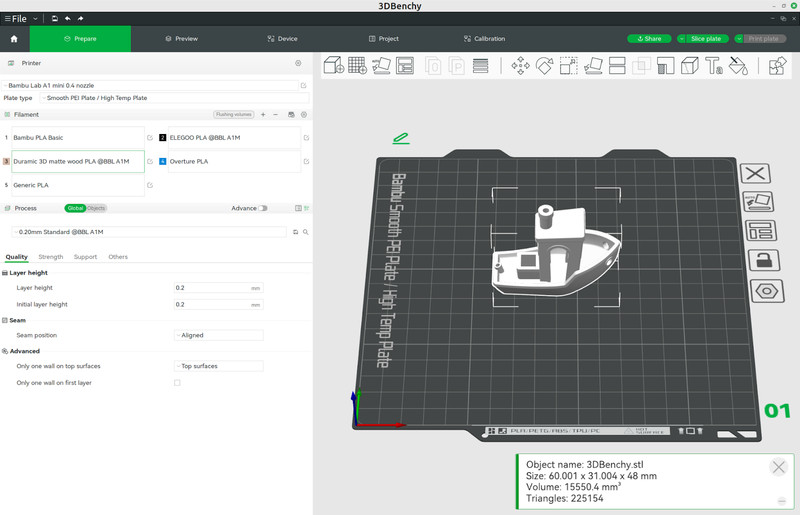Bambu Studio - Overview
Slicer Summary
| Download Link | Https://bambulab.com/en/download/studio |
| Compatibility | Windows, Mac |
| Open Source | No |
| Based on | PrusaSlicer |
| Owning brand | Bambu Lab |
History
Bambu Studio is a fork of PrusaSlicer - this allowed Bambu Lab to release a well-established slicer customized for their needs in a short timeframe. Their first pre-release was on July 17, 2022 with V1.0.10.
Ease of Use
Bambu Studio’s user interface is somewhat cluttered, making it look a little intimidating for the new user. The default setting hides all but the most important settings - to see all settings, the user must select “advance” which then shows all settings. The settings are organized into categories - quality, strength, support and others. Between all these categories, there are at least as many settings as most of the other slicers we have listed. The printer settings and filament settings can be viewed and altered in other large dialog boxes, each with multiple categories. For example, the filament settings are divided into filament, cooling, setting overrides and advanced. This is a lot of settings to go through. Fortunately Bambu Studio’s presets lead to good results out of the box.
Features
Bambu Studio is based on PrusaSlicer so some object manipulation tools in the user interface resemble those in PrusaSlicer. It also handles multiple objects well, allowing different settings for each.
There are extensive settings if you go through all the menus. Bambu Studio introduces the concept of plate types - Bambu Lab printers can choose between cool plate / PLA plate, engineering plate, smooth PEI plate / high temp plate or textured PEI plate. These alter the Z offset and the bed temperature for each filament type. As well, multiple objects can be positioned on multiple plates with different settings per plate or per object and the entire project can be saved as one file.
Bambu Studio’s main feature is integration with a networked Bambu Lab printer. Multiple filaments are listed and can be synced from the Bambu Lab AMS or AMS lite. These can be assigned to different objects on the print bed or “painted” onto sections of an object. There is a device tab which allows full control of the printer, shows its current status and print progress, and displays the camera video.

A prominent “share” button shares the model with MakerWorld, Bambu Lab’s online model database. The current plate or all plates can be sliced, and sliced files can be sent directly to the printer, the printer’s microSD card or exported as G-code.
There is also a calibration tab which can trigger manual flow dynamics calibration, though this is normally done automatically. There is also a manual flow rate calibration. Normally this does not need to be adjusted for well-performing printers and filaments and in the Bambu Lab X1 this is automatic. But it is a unique feature and useful for Bambu Lab’s other printers.
Compatibility
As the name implies, Bambu Studio is designed to support Bambu Lab printers, so that’s where it’s greatest compatibility lies. However, Bambu Lab does want wide adoption of their slicer, and since it’s ultimately derived from the open-source Slic3r which did support a wide variety of printers, Bambu Studio does support printers from some other manufacturers.
In addition to all Bambu Lab printers, Bambu Studio supports printers from Anker, Anycubic, Creality, Elegoo, Prusa, Qidi, Tronxy, Vivedino, Voron and Voxelab. Unfortunately, it’s mostly older printer models that are supported.
Community Support
Bambu Lab printers are very popular and their Bambu Studio slicing software has risen in popularity. It was not developed from scratch so it was able to get started quickly and gain many users.
The Bambu Lab community support forum which supports the company, its printers and its software has 10,900 members and although there is a Bambu Lab Software section, it’s hard to tell how many members are only there for the software. Bambu Lab’s Discord has 17,905 members although it too is not solely devoted to Bambu Studio. Bambu Lab’s official subreddit has 78,300 members. The Bambu Lab official Facebook group has 54,500 members.